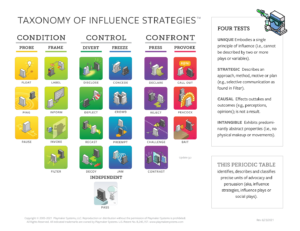Information Professionals Association charter member Alan Kelly recently published in Small Wars Journal an essay titled: “Why Responding is Losing: The Plays We Run (and the Plays We Don’t) to Defeat Disinformation.” According to Kelly, president and founder of Playmaker Systems, LLC and author of The Elements of Influence: The New Essential Systems for Managing Competition, Reputation, Brand and Buzz, the new essay provides his take on how reflexive policies of response may be fueling, not snuffing, bad actors.
Kelly updates his Taxonomy of Influence Strategies, an ontology featuring 23 strategies observed in communications, finance, marketing, media, military and government intelligence, politics and sales across professions, governments, regions, customs and cultures, to show how actors and responders run various “plays” and the impact they have. Kelly proposes nine specific plays that responders should run more often to defeat competitive influencers, particularly in disinformation campaigns. They include invoking Labels, Decoys, Preempting, and Baiting, among others.

In a discussion appropriate for Super Bowl Sunday, it is often said the best defense is a better offense. Kelly’s taxonomy promotes a variety of offensive and defensive actions to dominate the game of influence, and move minds and markets. But he notes it’s often the plays that are less obvious or infrequently used that will score the winning touchdown. The most used responses often stoke the enemy’s fire or simply increase risk for the responder.
“Perhaps most important, in the face of epidemic hyperbole and deception, this framework offers us a rational, objective and universal language for winning, not just managing the information wars that are here and that are coming,” Kelly says at the conclusion of the article.
Alan Kelly can be contacted at akelly@playmakersystems.com and followed on twitter @playmakeralan.
